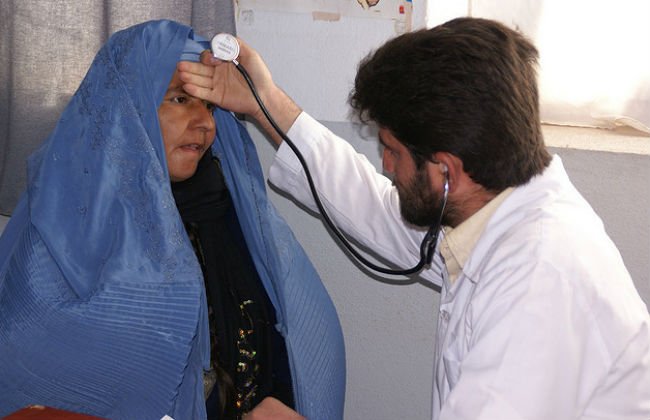At any given time, 800 million women, girls, non-binary people, and transgender men around the world are menstruating. Yet, menstruation is still a taboo topic and one cloaked in many myths, especially for those living in poverty.
While these myths might seem like they verge on the absurd, in some parts of the world, they have serious implications and consequences, setting behavioral restrictions, contributing to gender-based discrimination, barring people who menstruate from jobs and education, and holding back the fight for gender equality. In extreme cases, these myths can be fatal.
Such was the case of Parbati Buda Rawat, a 21-year-old woman who suffocated after lighting a fire to keep warm in the hut she was exiled to for the duration of her period. Known as "Chauupadi", this is a longstanding tradition that requires people who menstruate to stay in a small shed outside while they bleed.
Unfortunately, Rawat wasn’t the first and although the Nepalese government criminalized the practice in 2005, it continues in many communities. Indeed, while Chauupadi is a Nepalese tradition, such practices take place globally and are the consequence of the prevailing association between menstruation and "impurity".
The belief that menstruation is dirty or shameful can also have damaging impacts on adolescents’ education, contributing to fears of participating in school activities, sports, or social events — and it’s a global issue.
In India, a staggering 23 million girls drop out of school early when they start menstruating. Missing days at school and getting left behind peers can lead to dropping out altogether, which puts many at greater risk of child marriage.
Meanwhile, in Australia, a 2021 study found that 1 in 5 menstruating students was too embarrassed to go to school when they had their period.
A core challenge in tackling period stigma is that menstrual health education is lacking in many regions of the world. But experts agree that part of the solution lies in demystifying periods at a grassroots level. Radha Paudel, founder of the charity Action Works Nepal, says: “It’s very simple. Menstruation is natural … and we need to deliver the scientific message.”
These are among the most common period myths still affecting menstruating people.
1. Periods Are a 'Woman’s Issue'
While conversations about periods often frame them as a "women's issue," it's important to acknowledge that transgender men and non-binary people also have periods, while also remembering that not all women menstruate.
The start of menstruation signals a new phase of an adolescent’s life – and, as Unicef points out, new vulnerabilities. While teenage girls may face exclusion, stigma, and more, transgender men and non-binary people face a different type of discrimination due to their gender identity, which can lead to them being deprived of the information and materials they need.
Menstrual rights are human rights. Period.
2. Periods Mean You’re Ready for Marriage
According to the International Planned Parenthood Federation (IPPF), one troubling misconception about menstruation is that the onset of periods signals the start of "sexual maturity," which in turn means that child marriage can be considered.
Among the Twa, Zulu, Himba, and Niger-Delta communities in Africa, for instance, it is generally accepted practice for adolescent girls to perform traditional puberty rituals that involve learning about sex, motherhood, and the demands of marriage. These ceremonies mark a girl’s entry into adulthood and are also a public announcement to the rest of the tribe that she is ready to be married.
In Papua New Guinea, during interviews carried out by IPPF with men about periods, one responded: “When I hear the word menstruation, I know that a girl or woman is bleeding and I know that she is now ready for marriage.”
While menstruation is one indication of biological fertility, it does not mean that girls have reached physical, mental, psychological, or emotional maturity. Periods are a sign of the beginning of puberty, not a sign that menstruating people are "ready" to get married, have sex, or give birth.
3. Menstruating People Will Give Men 'Cooties'

Have you ever heard about menstruating people spoiling food, causing infants tummy aches, or spreading disease? These are all myths that come back to the idea that people who are menstruating are "unclean" or "impure".
This also leads to women being barred from holy places and public spaces like temples in many parts of the world, which is a form of gender inequality that limits women from the same human rights, such as the freedom to practice religion, that men have access to.
But menstrual fluid is not dirty and is not an excretion like urine or feces. It doesn’t remove toxins from the body. Periods just help keep the lining of the womb healthy.
However, progress is being made. In 2018, India's Supreme Court ruled that women could no longer be barred from entering the Sabarimala temple, considered to be one of the holiest for Hindus.
4. Menstrual Blood Can Be Used by Evil Spirits
Menstruation was a mystery before science could explain it. So many ancient civilizations created stories to fill in where logic couldn’t. After all, how could a woman bleed every month without dying? But some of those stories suggested menstruation was a curse or related to magic in some form.
In some cultures, women bury the cloth they use to collect their menstrual blood because it is believed that otherwise they can be used by evil spirits.
In Suriname, South America, menstrual blood is believed to be dangerous and makes the menstruating person more vulnerable to the harms of black magic ("wisi").
The Enga, Kaulong, and Senseng cultures of New Guinea believe that sexual intercourse with a menstruating woman will drain and weaken a man.
These myths all feed into the shame that people who menstruate experience but have various origins.
In India, for example, the origin of this myth dates back to the Vedas (a large body of religious texts originating in ancient India). In the Veda, it is written that guilt (specifically from brāhmanahatya — the killing of a Brahmin) appears each month as menstrual flow as the women took it upon themselves a part of God Indra’s guilt for killing Brahmins.
In Mayan mythology, menstruation was believed to have originated as a punishment after the Moon Goddess — who represented fertility — slept with the Sun god.
5. Menstruation Is a Disease

The long standing stigmatization of menstruating people has resulted in 48% of girls in Iran and 10% of girls in India believing that menstruation is a disease.
6. Tampons Will Break Your Hymen and Take Your Virginity
This one is part of a bigger myth that the breaking of the hymen is the same as losing your virginity.
By definition, a virgin is someone who has never engaged in sexual intercourse. So you can’t lose your virginity to a tampon.
The reason this myth is so dangerous is because of the prevalence of a procedure called a hymenoplasty. This is a surgery that attempts to recreate a woman's hymen to "restore her virginity", and has been described as a form of “honor-based abuse”.
7. Sharks and Bears Will Attack You on Your Period

While this one might make some of us laugh, it’s part of a bigger subset of myths that result in behavioral restrictions.
These are myths that discourage menstruating people from participating in physical activities during their menstrual cycle.
And just in case you’re wondering, there is no data to support claims that menstruating people attract predators.
The first step to menstrual equity is to normalize menstruation and end taboos around this natural phenomenon. Find out more here about period poverty and how you can help tackle it with Global Citizen.